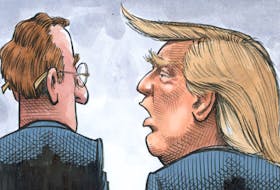According to the premier of Quebec, it’s all about pride. Quebecers, Francois Legault claims, are forever stopping him in the street to tell him “‘Mr. Legault we are happy.’ I say why and they say ‘it’s because we are proud.’… To feel this regained pride among our people, who are standing up, advancing, makes me the happiest man in the world to be their premier.”
And what is this miraculous thing that has restored Quebecers’ sense of pride to them? What has prompted ordinary Quebecers to buttonhole the premier to tell him how happy — and proud — they are? A bill that prohibits those in “positions of authority” in the civil service, including not only judges and police officers but teachers, from wearing religious symbols on the job.
Which is to say, that prohibits those whose faith obliges them to wear such symbols from working in those positions. Or if we are really being frank, that bars them to observant Muslims — also Sikhs and some Jews, but really Muslims.
That, according to the premier, is what has caused Quebecers to walk erect again: Bill 21, “An act respecting the laicity of the state,” passed in a special weekend sitting of the legislature, with the help of closure.
The bill will of course face a raft of court challenges, its prophylactic invocation of the notwithstanding clause, er, notwithstanding. The clause may save the law from judicial invalidation on the grounds of its manifest violations of Charter guarantees of equality or religious freedom, but it does not shield it from judicial scrutiny on other grounds: as a possible violation of the division of powers, say, or of women’s rights, or indeed as an improper use of the clause itself.
Whether the courts will be willing to go to such novel lengths remains in doubt. So we are faced with a question I raised some months ago: is this a state of affairs the country can tolerate? On the evidence, it would seem we can. The government of the second-largest province in the country has just passed a law forbidding the province’s religious minorities from working in much of the public service — and when we say religious minorities, we are typically also talking of racial minorities — and the reaction elsewhere is … silence. No federal leader issued a statement in response. No other premier spoke up.
Oh, there was some perfunctory criticism from both quarters when the bill was introduced, though in curiously muted language. Justin Trudeau ventured, indirectly, that he didn’t think “that a lot of people feel that … we should be legitimizing discrimination of our citizens based on religion.” Andrew Scheer noted, vaguely, that “a society based on fundamental freedoms and openness must always protect fundamental individual rights and should not in any way impede people from expressing themselves.” Even Jagmeet Singh, whose turban would preclude his employment as a cop or teacher in Quebec, confined himself to observing that “this law that is being proposed is something that divides the population… instead of bringing people together.”
But now even that is apparently too much. Whether or not one thinks some sort of federal action is required — I do not see why it is any less legitimate for the federal government to use its constitutional power to “disallow” provincial legislation than for the Supreme Court to do so, but neither is that the only means at the feds’ disposal — it is extraordinary that it should not even be considered worthy of comment.
If this had been tried in any other province — well, why proceed? It wouldn’t be tried in any other province. But if it were, the feds, the media and the rest of the great and the good would descend on the offending province like Moses from Mount Sinai, full of fiery denunciations of the bigotry that presumably inspired it. But because it is Quebec — and, one suspects, because there’s an election in the offing — we are invited, as ever, to understand, or at any rate to shut up.
We have to avoid the temptation to abstraction. This is not merely an “intrusion on religious freedom” or “incompatible with religious equality” or “a misunderstanding of religious neutrality.” It is a religious hiring bar. Its effect, if not its aim, is to enforce a kind of segregation over much of the public sector.
To be sure, it applies only to some jobs, and not the whole of the civil service, as the Parti Québécois had previously proposed in its “charter of values.” And the government has partially exempted existing employees: while they would not be fired from their current jobs — no tearful scenes for the networks — neither could they move to a new location, take a new job, or accept a promotion within the areas prohibited to them.
But this is small comfort to those Quebecers who might aspire to work as teachers, police officers, judges and so on, whose government has essentially told them: No Muslims (or Sikhs, or orthodox Jews) need apply. Even existing employees who profess these faiths must surely see how limited a future the government has in mind for them. Over time, they may be expected to take the hint, and leave.
We are surely past the stage now where some tenured idiot will attempt to justify this in the name of French concepts of secularism or Quebecers’ scarred memories of their Church-dominated past, but just in case: it is probably no coincidence that Bill 21 should have been passed on the same weekend as Bill 9, another law of dubious constitutionality that would impose a “values test” on immigrants to the province. This is about putting the province’s minorities — religious, racial and otherwise — in their place.
Which leaves the rest of us with a decision to make. Sixty-odd years ago the United States decided it was not prepared to tolerate racial segregation in its schools in the name of “states’ rights.” Will we tolerate religious segregation in the public service on the principle that “what happens in Quebec stays in Quebec”?
Copyright Postmedia Network Inc., 2019








